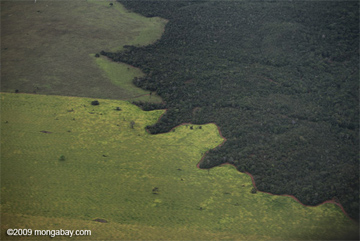|
|
By investing billions in conserving natural areas now, governments could save trillions every year in ecosystem services, such as natural carbon sinks to fight climate change, according to a European report The Economics of Ecosystems and Biodiversity (TEEB).
As reported by Reuters, a one time investment of 45 billion dollars in protected areas the global economy could save ecosystem services worth 4.5-5.2 trillion annually, German Environment Minister Sigmar Gabriel told reporters, adding that this was more than the value of the global car, steel and information technology sectors.
The TEEB report focused on the economic cost of biodiversity loss around the world. For years, biologists have been warning that the world may be entering a new mass extinction with extinction rates estimated at a thousand times above normal. This cumulative loss of biodiversity, if allowed to continue, will have great economic consequences according the report.
 Pastureland and transition forest in Mato Grosso, Brazil (April 2009). Since 2003 Brazil has set aside 523,592 square kilometers of protected areas, accounting for 74 percent of the total land area protected worldwide during that period. Photo by Rhett Butler. |
Global forests are being burned and logged at unprecedented rates, although these natural forests absorb an estimated 15 percent of annual global greenhouse gases and their destruction releases significant amounts of carbon into the atmosphere. Mangroves, also experiencing heavy deforested and degradation, have been shown to mitigate the impact of natural disasters and storms.
Coral reefs, which support hundred of millions of people worldwide through fishing and tourism are being devastated by global warming.
“The ecosystem services from coral reefs – ranging from coastal defense to fish nurseries – are worth up to USD$170 billion annually; an estimated half a billion people depend on them for livelihoods and more than a quarter of all marine fish species are dependent on coral reefs,” Pavan Sukhdev, TEEB’s study leader said.
“The climate stabilization goals of many governments may prove sufficient for some ecosystems and some biodiversity but there is now a real question mark against the survival of coral reefs world-wide and their natural treasure troves.”
Other ecosystem services linked to biodiversity include pollination of crops, seed dispersing to support the growth and health of forests, natural pest-control for agricultural, new discoveries in medicine, soil formation and retention, clean water, and food. A significant investment in conservation now could preserve these services for years to come.
The study recommended that delegates at the UN Summit on Climate Change in Copenhagen in December make stabling a payment system for forest conservation a priority, otherwise known as REDD.
But Sukhdev says that more than economics are at stake: “The economic consequences are significant, but so are the social and humanitarian ones. It underlines that a simple cost-benefit analysis alone will fail to capture the ethical dimensions of international climate policy decisions now and in the coming years and decades -especially in respect to an ecosystem at a climatic tipping point.”
Related articles
Ecological restoration substantially boosts biodiversity and ecosystem services
(07/30/2009) A new analysis reports that ecological restoration generally deliver benefits for both conserving biodiversity and supporting human livelihoods, but does not completely reverse degradation caused by humans.
Are we on the brink of saving rainforests?

(07/22/2009) Until now saving rainforests seemed like an impossible mission. But the world is now warming to the idea that a proposed solution to help address climate change could offer a new way to unlock the value of forest without cutting it down.Deep in the Brazilian Amazon, members of the Surui tribe are developing a scheme that will reward them for protecting their rainforest home from encroachment by ranchers and illegal loggers. The project, initiated by the Surui themselves, will bring jobs as park guards and deliver health clinics, computers, and schools that will help youths retain traditional knowledge and cultural ties to the forest. Surprisingly, the states of California, Wisconsin and Illinois may finance the endeavor as part of their climate change mitigation programs.
Massive deforestation in the past decreased rainfall in Asia

(06/25/2009) Between 1700 and 1850 forest cover in India and China plummeted, falling from 40-50 percent of land area to 5-10 percent. Forests were cut for agricultural use across Southeast Asia to feed a growing population, but the changes from forests to crops had unforeseen consequences. A new study published in the Proceedings of the National Academy of Sciences links this deforestation across Southeast Asia with changes in the Asian Monsoon, including significantly decreased rainfall.